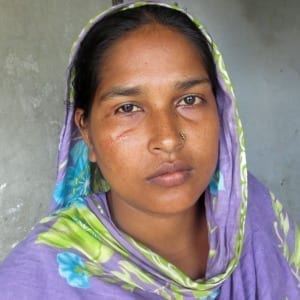
Morsheda is forced to send her son to live with relatives because she can no longer support him after being injured in the Tazreen Fashions factory fire. Credit: Solidarity Center
Morsheda could not travel to her home village in Bangladesh for the recent Eid holiday because she could not afford the trip. Her 9-year-old son, who lives in the village with his grandmother, told neighbors there that he does not have parents because if he did, they would be with him for the holiday
“You cannot imagine how very painful it is for parents to hear such words from their child,” she said.
Since sustaining severe injuries in the November 24, 2012, Tazreen Fashions garment factory fire, Morsheda, 25, has been too disabled to work. Without funds for her son’s education, she sent him to live with her relatives.
Morsheda has lost the use of her right hand, so badly damaged during her flight from the blaze that swept through the multistory factory that she can only prepare meals with the help of her sister. To get out of the factory, Morsheda, like nearly every Tazreen survivor, was forced to jump from a window to safety after she and co-workers found the stairwell exits locked. They escaped even though their manager had ordered them back to work when the fire alarm sounded. Her right eye was gashed as a result of her fall, and she still has difficulty seeing from it.
“My whole body is swollen when I wake up from sleep,” she said. “Every night I feel pain in my right leg and my waist.”
Her husband, also a garment factory worker, is not paid enough to buy the medicine she needs. “With his income, it is tough to buy medicine, to run a family, to pay for my son’s educational expenses, to pay back loans, etc.,” she said. The little money Morsheda received in compensation for her injuries was quickly spent on her medical care.
Morsheda believes that the factory owner, the brands and the government have forgotten her and the thousands of other Tazreen garment workers now too injured to support themselves and their families. Morsheda says she needs real assistance if she and her family are to survive.
Morsheda and her husband came to Dhaka, the Bangladesh capital, several years ago in search of jobs. With two incomes, the couple could pay for their son’s education. But now, out of school and missing an education, they fear their child will face a bleak future, one that likely will continue the cycle of poverty.
“Leading a better life is not only the hope of rich people but also the poor people like us,” Morsheda said, crying. “Garment owners have much money. They have the capability to run so many garment factories. They have nothing to lose. But we poor have lost everything.”
